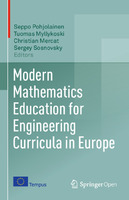Modern Mathematics Education for Engineering Curricula in Europe
A Comparative Analysis of EU, Russia, Georgia and Armenia
Contributor(s)
Pohjolainen, Seppo (editor)
Myllykoski, Tuomas (editor)
Mercat, Christian (editor)
Sosnovsky, Sergey (editor)
Language
EnglishAbstract
This open access book provides a comprehensive overview of the core subjects comprising mathematical curricula for engineering studies in five European countries and identifies differences between two strong traditions of teaching mathematics to engineers. The collective work of experts from a dozen universities critically examines various aspects of higher mathematical education. The two EU Tempus-IV projects – MetaMath and MathGeAr – investigate the current methodologies of mathematics education for technical and engineering disciplines. The projects aim to improve the existing mathematics curricula in Russian, Georgian and Armenian universities by introducing modern technology-enhanced learning (TEL) methods and tools, as well as by shifting the focus of engineering mathematics education from a purely theoretical tradition to a more applied paradigm. MetaMath and MathGeAr have brought together mathematics educators, TEL specialists and experts in education quality assurance form 21 organizations across six countries. The results of a comprehensive comparative analysis of the entire spectrum of mathematics courses in the EU, Russia, Georgia and Armenia has been conducted, have allowed the consortium to pinpoint and introduce several modifications to their curricula while preserving the generally strong state of university mathematics education in these countriesThe book presents the methodology, procedure and results of this analysis. This book is a valuable resource for teachers, especially those teaching mathematics, and curriculum planners for engineers, as well as for a general audience interested in scientific and technical higher education.
Keywords
Education; Mathematics—Study and teachingDOI
10.1007/978-3-319-71416-5Publisher
Springer NaturePublisher website
https://www.springernature.com/gp/products/booksPublication date and place
Cham, 2018Classification
Teaching of a specific subject


 Download
Download Web Shop
Web Shop